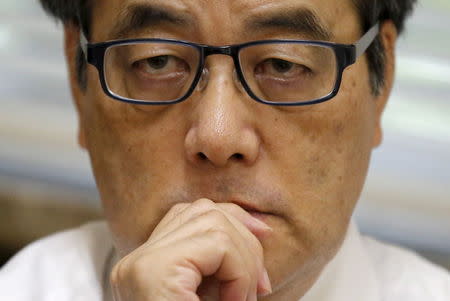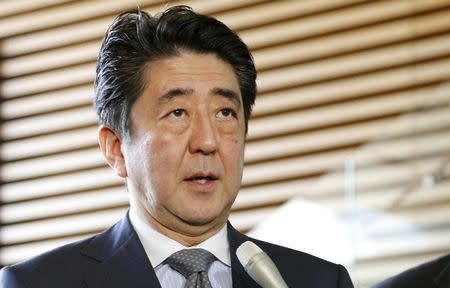Japan's Abe faces growing risk on security shift: opposition leader
By Linda Sieg TOKYO (Reuters) - Japanese Prime Minister Shinzo Abe will be taking a big risk if he pushes through a dramatic change in security policy despite objections from most citizens, who want a better explanation why the change is needed, a top opposition figure said on Tuesday. Abe's ratings have slipped over the security policy shift, which could let Japanese troops fight abroad for the first time since Tokyo's defeat in World War Two, and which he hopes to enact into law in a parliament session that runs until Sept. 27. The ruling bloc has a majority that would allow it to enact Abe's bills, but any perception of high-handedness could erode support further even as the prime minister eyes re-election as head of his Liberal Democratic Party in September. "Ultimately, it depends on public opinion," Katsuya Okada, the head of the main opposition Democratic Party of Japan (DPJ), told Reuters, when asked if Abe's bloc could be kept from forcing a vote in parliament's lower house. That step could come as soon as next week. "Pressure on the administration is mounting," Okada, a former foreign minister, said in an interview. Abe's support fell three points, to 42 percent, in a Mainichi newspaper survey published on Monday. Sixty-one percent of respondents opposed passage of legislation in the current session to end a ban on exercising the right of collective self-defence, or militarily aiding a friendly country under attack. "Basically, I think we face a choice between two paths," Okada added. Will we stick to the pacifism of the constitution or become a 'normal' country?" Conservatives say Japan's post-war constitution puts limits on its ability to defend itself that are too severe. Proponents say it has kept the nation at peace, and reinterpreting it outside formal amendment procedures sets a dangerous precedent. Okada, 61, acknowledged Japan faces a tough security climate and said collective self-defence might be a future option. But conditions set in the bills were too abstract and there was a high likelihood it violated the constitution's pacifist Article 9, he said. Some analysts say Abe's ratings could slip as much as 10 points if the bills go through, possibly encouraging a rival to challenge him in the LDP leadership race. But the Democrats, ousted in 2012 after three rocky years in power, have made few gains. Seven percent backed the DPJ in the Mainichi poll, versus 31 percent for the LDP. (Reporting by Linda Sieg; Editing by Clarence Fernandez)

 Yahoo News
Yahoo News 




